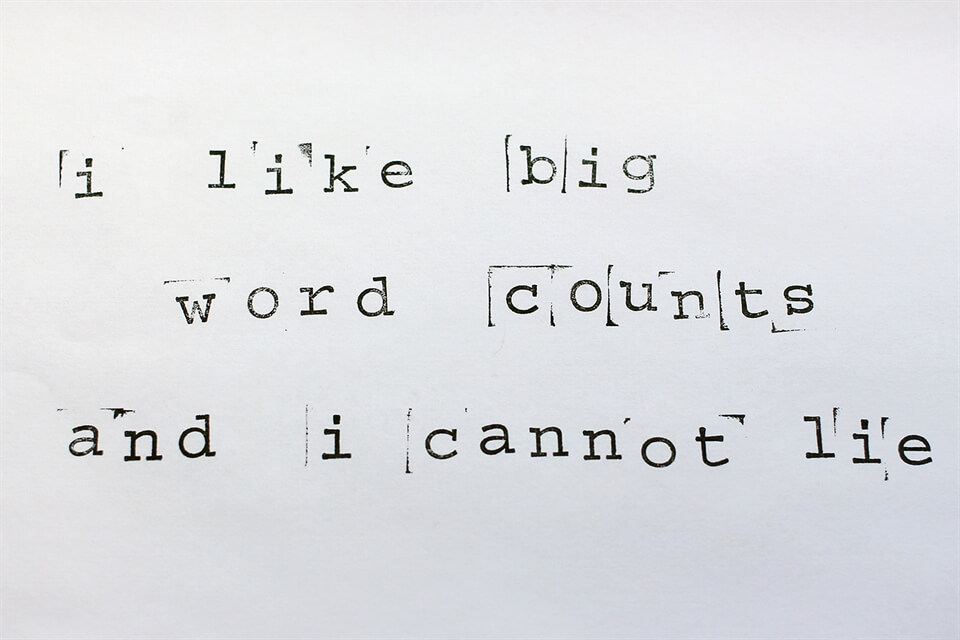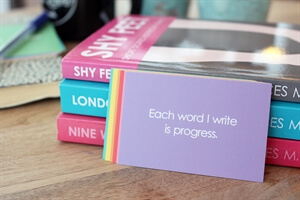NaNoWriMo Inspiration (Day 22): Ten Ways to Pad Out Your Word Count
Ten Easy Ways to Pad Out Your Word Count
Seriously, Frankie? You're telling us these tips now? I can hear you say. If you'd only dished these out three weeks ago I'd be at 50,000 words by now.
Well, would you?
Actually, yes, maybe you would. Because these are pretty good tips at ways to pad out your word count, increase how many words are in your manuscript and get you closer to your 50,000 word goal.
But there's a good reason why I didn't share these with you earlier, namely, you needed those first few weeks to just write what mattered and to not be so focused on word counts (although it's kind of inevitable that by the end of Week 1 you're checking your word count every few seconds). Now, however, you're tired, you are anxious about completing and although you can just about see the end in sight, it's still a distant speck on a blurry horizon. That's why you need these NOW and not THEN.
Though they should all be taken with a pinch of salt and never, ever shown to the Writing Gods, whoever they are.
(Please note: many of these tips are suitable only for non-fiction writers, sorry about that!)
Give one of your characters a double-barelled name.
Or add surnames much more frequently. Alternatively have a character called "Mr Something" or "Mrs Something" or better yet, a Dutch character "Mr Something van de Something-Else". Either way, you're adding hundreds of words with minimal brain work. And no, it doesn't matter that these will be amended or deleted come the editing stage, your goal now is to make it to 50,000 words not worry about what happens next.Add in additional description of where action in your novel takes place.
Not only will this help you pad out your word count but it may also mean you have a stronger sense of place. Even if the words you write now are chopped later, they give you a better grasp of what's going on in your story and may help avoid inconsistencies and plot holes.Add "very" before every adjective.
I have to be very honest with you, this is not my strongest writing tip but it is very true, that adding "very" before every very nice descriptive word will turn your first draft from a very short one to a very long one. Oh, I'm so very sorry... that was so very bad of me to give this very unhelpful tip. (NINE EXTRA WORDS IN THAT PEOPLE!!!)Add notes to yourself and keep them in there.
Some would call this cheating because those notes aren't actually part of your novel, but I call it bending the rules, because those notes ARE part of your novel. If they remind you whereIf you have time, go back and fill in the blanks.
Remember the "system" I advised you to adopt to help you write faster? Well, if you have a few spare hours this week and a real fear of not making your word count, now's the time to go back to any blanks and fill them in with as much detail as you possibly can.Use more than one word / give yourself options.
I do this all the time when I'm copywriting, not because I want to pad out my word count (for more often than not my job is to cut words not add them) but because I'm unsure of which word works best in certain scenarios. Be it a verb, an adjective or even an adverb (though most novel writers will tell you to ship those off home quicksmart) I will type all the available options I think would work, rather than settle for / choose / decide on one and worry about editing it later. This adds / contributes to / plumps up the word count, and helps me out later / at a later date / as and when I'm ready to look at my finished first draft again.Make sense / are you with me?Make one of your characters the most talkative person you've (n)ever met.
I did this in the first draft of my short story Angel - her name is Gladys, if you're familiar with the story - and although she was a nightmare to edit, her one page long monologues did help pad out the word count. I may bring her back for a surprise cameo in the current story I'm writing.Do some character development.
So yeah, this really is cheating, but I maintain the words should count towards your overall goal as they are progressing your plot and story in more ways than one, they just may not appear in the actual flow of your first draft. However, answering these questions about one or two (or more) of your characters will give you hundreds of extra words:
- How old is your character and when is their birthday?
- Where do they live? Have they always lived there?
- Who do they live with? Does your character get on with these people?
- What sort of a family does your character have? Tell me about their parents, siblings, partner, children and any pets they have?
- What are some of your character's ambitions in life?
- More importantly, what is your character trying to achieve in the novel you're writing?
- Name three famous people who could play your character in a movie?
- How much has your character travelled? Which is their favourite country? Where would they like to go next on their travels?
- What newspaper does your character read? If he/she doesn't read a newspaper, tell me why.
- You and your character are out on a date (roll with it!). Are you attracted to each other? Tell me why...
Create a "List of Fiction Facts".
A "List of Fiction Facts" is a list of everything that is true in your book. So of course it's not strictly true in the global sense of the word, but it's true as far as your book is concerned.Become more Dickensian
If all else fails, just write like Charles Dickens, who opened A Tale of Two Cities with a 119 word sentence. If all your sentences are 100 words long, that means you only need to write 500 sentences... that sounds easy, right?
Of course not. But nobody said it would be (very) easy / uncomplicated / a breeze, but guess what? You're doing it anyway!!
HAPPY WRITING!!!
Bookmark this page for NaNoWriMo Daily Inspiration Posts, every day in November 2014.

Frances M. Thompson
Find Frankie on Facebook, Twitter, Instagram, Pinterest, and Google+.

 Preptober Tips & 100 Preptober Prompts for NaNoWriMo Prep
Preptober Tips & 100 Preptober Prompts for NaNoWriMo Prep On Writing: The Only NaNoWriMo Tips You'll Ever Need
On Writing: The Only NaNoWriMo Tips You'll Ever Need On Writing: Ten Tips for NaNoWriMo
On Writing: Ten Tips for NaNoWriMo NaNoWriMo Inspiration (Day 30): Someday Soon All This Will Be Someone Else's Dream
NaNoWriMo Inspiration (Day 30): Someday Soon All This Will Be Someone Else's Dream NaNoWriMo Inspiration (Day 29): Ten Songs That Are Actually Novels in Disguise
NaNoWriMo Inspiration (Day 29): Ten Songs That Are Actually Novels in Disguise About the Blog & Frankie
About the Blog & Frankie Welcome to My Amsterdam Travel Blog!
Welcome to My Amsterdam Travel Blog! Welcome to My Luxury Family Travel Blog!
Welcome to My Luxury Family Travel Blog! Welcome to My Writing Blog!
Welcome to My Writing Blog! Lover Mother Other: Poems - Out Now!
Lover Mother Other: Poems - Out Now! I Write Stories That Move You
I Write Stories That Move You Order WriteNOW Cards - Affirmation Cards for Writers
Order WriteNOW Cards - Affirmation Cards for Writers Work With Me
Work With Me